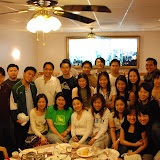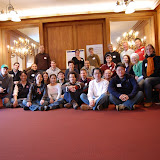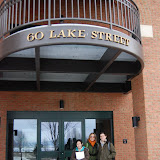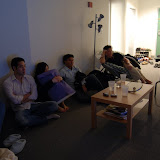View Paul Otellini: Intel in China on FORA.tv
Tuesday, December 11, 2007
View Paul Otellini: Intel in China on FORA.tv
Sunday, December 02, 2007
Sunday, November 18, 2007
Sunday, October 21, 2007
Friday, October 19, 2007
ไม่รู้ใครคิดคำนี้ขึ้นมา แต่มันเป็นเรื่องจริงมากๆ เมื่อวานนี้นั่งรถ Fung Wah จาก South Station ไป NYC ใช้เวลาทั้งสิ้น 4 ชั่วโมง ไปถึง NYC ก็ 5 ทุ่มพอดีเด๊ะ รู้สึกเหนื่อยอย่างบอกไม่ถูก ปวดก้นอีกต่างหาก ไม่เข้าใจว่าทำไมเราต้องลำบากลำบนขนาดนี้ด้วย ในขณะที่ญี่ปุ่นมันไม่เห็นต้องขอ Visa เพื่อเข้า Canada เลย แต่ก็เอาเหอะ บ่นไปก็เท่านั้น
พูดถึง Fung Wah แล้วก็เลยอดสงสัยว่ามันเกิดมาได้อย่างไร เลยไปลองเปิด Wikipedia ดู ก็ดันเจอซะด้วย ข้าน้อยขอยกนิ้วให้ ลองหยิบประวัติของ Fung Wah มาแปะให้อ่านไว้เล่นๆ
The first company to offer such services was the Fung Wah Bus, which began routes between New York City and Boston in 1998.[3] The bus service was originally intended for transporting ethnic Chinese restaurant workers from one Chinatown to Chinatowns in other cities. Now, some bus lines are also used to transport large groups of mainly Chinese and Vietnamese immigrants to and from casinos such as Foxwoods and Mohegan Sun, which are located in Connecticut. These gambling buses built upon the popularity of older bus routes to Atlantic City that also targeted Asian American customers.
Given their relatively competitive fares to the mainstream Greyhound Lines, it has become popular among non-Chinese customers as well, especially students. The bus service has gained such popularity that it was mentioned in several articles in the New York Times and on the radio programs Marketplace and Morning Edition on National Public Radio.[original research?] Recently, competition has come from the Jewish-owned Washington Deluxe and Vamoose, both of which have mostly non-Chinese customers.
Increasing popularity has also led to increasing regulatory interest. In September 2004, the City of Boston required Chinatown bus services to shift their operations from the city's Chinatown to the South Station transportation terminal.
Fung Wah นั้นถือว่าเป็นที่เพิ่งของคนเบี้ยน้อยหอยน้อยอย่างเราจริงๆ เพราะไปกลับ NYC ก็จ่ายแค่เที่ยวละ $15 เท่านั้น จะเห็นได้ว่าบนรถ ไม่ได้มีแต่คนเอเชียเท่านั้น ฝรั่งมังค่า เจ้าของประเทศเองก็ใช้บริการ Fung Wah กันอย่างอุ่นหนาฝาคั่ง ด้วยความที่มันถูกมากๆ ในขณะที่ quality ก็อยู่ในระดับที่พอรับได้
Tuesday, October 16, 2007
Friday, October 12, 2007
Small but warm trek. See all 4 albums at my Picasa Web Album.
This is the last week for System Dynamics, one of the best and the most demanding classes at MIT Sloan School Management. I certainly miss Prof. Sterman with his funny, arousing teaching style. However, it is too much for me to take the full-term. I'm still thinking about taking Strategic Marketing Measurement or Corporate Governance......we'll see.
Friday, September 28, 2007
Wednesday, September 26, 2007
Wednesday, August 22, 2007
Monday, August 20, 2007
It is hard to predict whether Man City will be the champion this season or not. If it is, he will surely look better in the eyes of British government and British people. In my opinion, it's not bad to have a Thai businessperson to be successful in an international setting. (again i'm not favouring him) .. Just hope that he will enjoy his position in Man City and will not come back to his political role as he promised.
---------------------------------
NEWS FROM FINANCIAL TIMES
Why Sven’s team tactics should win fans at the office
By Stefan Stern
Published: August 20 2007 17:30 | Last updated: August 20 2007 17:30
Does football (or soccer, if you must) provide the perfect metaphor for the art and practice of management? Maybe management provides the perfect metaphor for the art and practice of football – who can tell? But as another English football season metaphorically pulls on its boots and runs out on to the pitch, I would be failing in my columnist’s duty if I did not point out that, once again, the beautiful game has something to teach us about the business of managing people and organisations.
Consider for a moment the underperforming and almost perennially disappointing phenomenon that is Manchester City Football Club. (Non football fans: stick with this, you might learn something.)
Manchester City FC (sky blue shirts) is the less famous and hugely less successful local rival to Manchester United (red shirts). While Man U’s list of greats contains such legendary names as Bobby Charlton, George Best and Dennis Law, Man City’s heroes, considerable players in themselves, have almost never achieved a similar fame.
As with the rivalries between Glasgow’s two major football clubs, Rangers and Celtic, or between Liverpool and Everton, or Roma and Lazio, the red and blue sides of Manchester look on each other with a mixture of loathing and disdain.
But while, in the other local feuds, fortune seems to favour first one side and then the other, in Manchester only the “Red Devils” have had anything to celebrate in the past 30 years, and for most of the two decades before that as well. Not for nothing did one City fan title his memoirs of growing up in the divided town Manchester United Ruined My Life. (Inferiority complex? Surely not.)
But as the new season dawns, the city that brought us the industrial revolution and provided the inspiration for Friedrich Engels and Karl Marx is playing host to a minor footballing revolution. Globalisation, in the form of ousted Thai prime minister Thaksin Shinawatra and new team coach Sven-Göran Eriksson, has come to Manchester City. And, so far, the fans like what they see. Eriksson, the former England manager, has built a new team by buying footballers he has never actually seen play in the flesh. Video clips of Brazilian, Spanish, Bulgarian, Italian, Swiss and Croatian players, supported by eyewitness accounts from football scouts, were all the Swedish manager required to decide on these acquisitions. He has been bankrolled by Thaksin, who bought the club for £81.6m earlier this year, and who has now given Eriksson another £40m with which to build the new team.
Sceptics doubted that this approach would work. “Lonely men have purchased wives from the Philippines on a similar basis,” the football writer David Lacey observed. But City won their first two games of the season and, after Sunday’s conquest of the old enemy Man U, the Man City faithful are happier than they have been for many years. They are sitting on top of the league.
Building a team by video clip would seem to run counter to what human resources gurus and psychologists have been advising all these years about hiring staff. Why should it be any different for footballers? Fans might reasonably ask: Who are these guys, and how will they operate together under pressure? And then there is the question of communication. With little or no spoken English, the new team members might struggle to understand each other.
But Eriksson is undaunted. “We’re giving them all teachers,” he told the Guardian newspaper. “One or two have already started, I think. But before that we’ll try to teach them ‘right’, ‘left’, ‘wait’, ‘come on’, ‘look out’ – the common language of football. It’s not like in 90 minutes you have a big conversation with your team-mates. But in the long term they have to learn properly, not just for football but also to feel at home in their new country.”
Good advice, of course, but not necessarily advice that Eriksson himself followed. As a manager in Italy and Portugal he learnt to communicate quite effectively. But in English Eriksson has always come across a bit like Chauncey Gardner, the Peter Sellers character in the film Being There: banal statements of the obvious were taken (in his honeymoon period with the national side) as profundities. In the end the England team, as well as its manager, were exposed as being simply banal.
Never mind. Today Eriksson is turning years of theorising about teams on its head. He is echoing the ideas of Lynda Gratton, a professor at London Business School, who says that the best teams are characterised by a co-operative mindset, an ability to span boundaries, and the successful igniting of purpose. Even people who work remotely from each other can collaborate to great effect.
And as for the management of Manchester City FC, the performance appraisal from fans is positive, for the moment at any rate. If you listen carefully, you’ll hear them register their approval in song (to the tune of “I’m H.A.P.P.Y.”):
I’m City till I die,
I’m City till I die,
I know I am, I’m sure I am,
I’m City till I die.
Saturday, August 04, 2007
Monday, July 30, 2007
 ปํญหาเรื่องรถติดไม่ได้มีแต่ในกรุงเทพฯ ของเราเพียงอย่างเดียว เมืองใหญ่ๆ หลายแห่งในโลกนี้ก็ล้วนแล้วแต่ประสบปัญหารถติดกันทั้งสิ้น กรุงเทพฯ อาจจะพิเศษหน่อยตรงที่ติดได้ทุกวัน ทุกเวลา ไม่เกี่ยงว่าจะเป็น rush hour หรือสุดสัปดาห์ อ่านข่าวใน Wall Street Journal ไม่นานมานี้ ว่ามหานครอย่าง New York ก็มีปัญหารถติดคาราคาซังอยู่เหมือนกัน จะไปไหนมาไหนที โดยเฉพาะในช่วง Rush Hour อาจจะต้องเผื่อเวลากันมากหน่อย เลยมีข่าวออกมาว่าทางผู้ว่าการของ New York อาจจะมีการเรียกเก็บเงินจากคนที่ขับรถเข้าถนนที่คังคั่งบางเส้นใน New York ว่ากันว่ามาตรการนี้ได้บังคับใช้ใน London มาก่อน และประสบความสำเร็จอย่างมาก
อย่างไรก็ตาม การใช้มาตรการนี้ต้องคำนึงถึงหลายๆ ปัจจัย เช่น ในบริเวณถนนที่บังคับใช้นั้น มีรถโดยสารมวลชน เช่น รถใต้ดิน หรือรถเมล์เพียงพอหรือไม่ ระบบดูแลรักษาความปลอดภัยสามารถรองรับคนจำนวนมากได้หรือเปล่า โดยส่วนตัวแล้ว รู้สึกเห็นด้วยกับมาตรการนี้เป็นอย่างยิ่ง เพราะนอกจากจะลดปริมาณมลภาวะในบริเวณนั้นแล้ว ยังสามารถลดปริมาณน้ำมันที่ถูกใช้ไปอย่างเปล่าประโยชน์ระหว่างรถติด แถมยังช่วยลดอารมณ์ฉุนเฉียวของคนที่ต้องทนรถติดได้อีก ไม่รู้ว่าเมื่อไหร่ทางเมืองไทยจะนำมาตรการนี้ไปใช้บ้าง กรุงเทพฯ ของเราจะได้สะอาดขึ้นและผู้คนอาจจะยิ้มได้กว้างขึ้นกว่าเดิม
ปํญหาเรื่องรถติดไม่ได้มีแต่ในกรุงเทพฯ ของเราเพียงอย่างเดียว เมืองใหญ่ๆ หลายแห่งในโลกนี้ก็ล้วนแล้วแต่ประสบปัญหารถติดกันทั้งสิ้น กรุงเทพฯ อาจจะพิเศษหน่อยตรงที่ติดได้ทุกวัน ทุกเวลา ไม่เกี่ยงว่าจะเป็น rush hour หรือสุดสัปดาห์ อ่านข่าวใน Wall Street Journal ไม่นานมานี้ ว่ามหานครอย่าง New York ก็มีปัญหารถติดคาราคาซังอยู่เหมือนกัน จะไปไหนมาไหนที โดยเฉพาะในช่วง Rush Hour อาจจะต้องเผื่อเวลากันมากหน่อย เลยมีข่าวออกมาว่าทางผู้ว่าการของ New York อาจจะมีการเรียกเก็บเงินจากคนที่ขับรถเข้าถนนที่คังคั่งบางเส้นใน New York ว่ากันว่ามาตรการนี้ได้บังคับใช้ใน London มาก่อน และประสบความสำเร็จอย่างมาก
อย่างไรก็ตาม การใช้มาตรการนี้ต้องคำนึงถึงหลายๆ ปัจจัย เช่น ในบริเวณถนนที่บังคับใช้นั้น มีรถโดยสารมวลชน เช่น รถใต้ดิน หรือรถเมล์เพียงพอหรือไม่ ระบบดูแลรักษาความปลอดภัยสามารถรองรับคนจำนวนมากได้หรือเปล่า โดยส่วนตัวแล้ว รู้สึกเห็นด้วยกับมาตรการนี้เป็นอย่างยิ่ง เพราะนอกจากจะลดปริมาณมลภาวะในบริเวณนั้นแล้ว ยังสามารถลดปริมาณน้ำมันที่ถูกใช้ไปอย่างเปล่าประโยชน์ระหว่างรถติด แถมยังช่วยลดอารมณ์ฉุนเฉียวของคนที่ต้องทนรถติดได้อีก ไม่รู้ว่าเมื่อไหร่ทางเมืองไทยจะนำมาตรการนี้ไปใช้บ้าง กรุงเทพฯ ของเราจะได้สะอาดขึ้นและผู้คนอาจจะยิ้มได้กว้างขึ้นกว่าเดิม
Wednesday, July 25, 2007
Lots of great works from great artists here but so sad that they don't allow visitors to take any pictures. All i could do was taking a picture of sculptures in the sculpture garden. If you happen to visit someday, I recommend to visit this museum on Thursday because it's FREE !!! (just like MFA in Boston)
Tuesday, July 24, 2007
เมื่อเร็วๆ มานี้ เชื่อว่าพี่น้องหลายคนคงได้รับ email จากคุณอภิสิทธิ์ เวชชาชีวะ และคุณกร จาติกวาณิช ที่น่าแปลกใจก็คือ email นี้เป็น friend request ใน hi5 โปรแกรม friends network ยอดนิยมของชาวไทย แสดงได้ถึงท่าทีที่ชัดเจนว่าประชาธิปัตย์กำลังต้องการจะสร้างกลุ่มฐานเสียงที่แข็งแรงในกลุ่มวัยรุ่น และคนเลยวัยรุ่นมานิดหน่อยอย่างพวกเรา
วัยรุ่นไทยหลายคนแสดงอาการใสซื่อเขียนลงใน wall ของคุณอภิสิทธิ์ "ไม่น่าเชื่อว่าคุณอภิสิทธิ์จะมีเวลามาเล่น hi5 ด้วย" อยากจะบอกว่าน้องเอ๋ย มันไม่ใช่คุณอภิสิทธิ์ที่เล่นหรอก มันคงเป็นทีมงานของเขานั่นแหละ คงอภิสิทธิ์เองคงมาแค่ชำเลืองดูสักทีสองทีแค่นั้นแหละ
แต่ก็ขอชื่นชมกับคนที่ออกไอเดียนี้ การเมืองไม่ใช่เรื่องของผู้ใหญ่ การเมืองไม่ใช่เรื่องไกลตัว การเมืองไม่ใช่สิ่งที่น่าเบื่อ แต่เป็นเรื่องที่ทุกคนที่ขึ้นชื่อว่าเป็นคนไทยต้องใส่ใจ ต้องช่วยกันดูแล ช่วยกันคิดว่าทำอย่างไรประเทศของเราถึงจะพ้นจากสภาพอึมครึม และไม่หวนกลับมาอึมครึมแบบนี้อีกในอนาคต ดูข่าวสองสามวันที่ผ่านมานี้แล้วอยากจะร้องไห้ ไม่น่าเชื่อว่าสยามเมืองยิ้ม ประเทศแห่งความสงบสุขแสนรักของเราจะกลายเป็นแบบนี้
Sunday, July 22, 2007
Wednesday, July 18, 2007
แต่สองสัปดาห์ที่ผ่านมานี้ได้ดูอีกรายการหนึ่ง แสบเซี้ยวพอกัน ชื่อว่า Date Line : To Catch A Predator ของ NBC รายการนี้หลอกพวกวัวแก่ชอบกินหญ้าอ่อนมาติดกับ ลองตัวตัวอย่างจาก Youtube ด้านล่างนี้ดูก็จะเข้าใจว่ารายการนี้เป็นอย่างไร
ที่น่าแปลกใจที่สุดก็คือรายการนี้มีมากว่า 3 ปีแล้ว มีเหยื่อมาติดกับกว่า 200 คน และถูกตัดสินว่าผิดไปแล้ว 117 คน แต่ก็ยังมีคนหลงมาติดกับอยู่เรื่อยๆ เหลือเชื่อว่ามีคนกิเลศหนามากมายอยู่บนโลกใบนี้ หลายคนก็สารภาพว่าเคยดูรายการนี้มาก่อน แต่ยังมิวายจะเดินหลงมาติดกับ เง็งเจงๆ
Monday, July 16, 2007
วันนี้ถือเป็นครั้งแรกที่เที่ยวคนเดียวในอเมริกา จริงๆ ตั้งใจจะไปเที่ยว Memorial Park แต่พอไปถึงแล้วรู้สึกไม่ค่อยมีมุมงามๆ ให้ถ่ายรูปเท่าไหร่ เลยต้องถามน้องจีว่าสถานที่เที่ยวใกล้ๆ มีอะไรบ้าง น้องจีบอกว่ามี Musuem of Fine Arts ห่างออกไปแค่เพียงไมล์กว่าๆ ก็ยิ้มดีใจเล็กน้อย ไปเที่ยว musuem ก็ได้วะ มีอะไรให้ถ่ายเยอะดี
ตามคำบัญชาของน้องจีไปจนถึงจุดหมาย ลงจากรถ ก็เห็นผู้คนมากมาย มากันเป็นครอบครัว มีลูกเด็กเล็กแดงเต็มไปหมด ก็รู้สึกประหลาดใจว่า พ่อแม่พาเด็กมาดู modern arts มันจะดูกันรู้เรื่องรึเปล่า แล้วบรรยากาศการเสพศิลปะวันนี้จะเต็มไปด้วยเสียงกระจองอแงหรือไม่
เดินไปถึงประตูทางเข้าก็ร้องอ๋อ ว่านี่มันไม่ใช่ musuem of fine arts แต่อย่างใด แต่เป็น Bayou Bend ที่อยู่ในความดูแลของ Musuem of Fine Arts ทำไมน้องจีไม่บอกพี่ให้หมดล่ะครับ
ว่าไปแล้ว ก็เลยเก็บภาพ Bayou Bend มาซะเลย จะได้ไม่เสียเที่ยว ก็จัดว่าเป็น garden ที่ไม่ใหญ่ไม่โตอะไร และก็ไม่ได้สวยงามอะไรนักหนา แต่ก็พอมีมุม มีพืชพันธุ์ให้พอชักภาพได้บ้าง
ตอนเด็กๆ เคยคิดเหมือนกันว่าอยากจะ backpack ออกไปท่องโลกตามลำพังเหมือนพวกฝรั่ง แต่ก็ไม่มีทุนทรัพย์และโอกาสเสียที คราวนี้ถึงจะไม่ใช่ backpack ก็ตาม แต่ก็ให้ความรู้สึกของการเดินทางลำพังดีเหมือนกัน เหงานิดๆ แต่ก็สบายตัวดี เฮ้อ
Sunday, July 15, 2007
Wednesday, July 11, 2007
Thursday, July 05, 2007
แต่เรื่องหนึ่งที่น่าสนใจเกี่ยวกับ DOW ก็คือ ตอนนี้ DOW กำลังถูกกดดันอย่างหนักจาก Wallstreet ตามข่าว
"What's not in dispute is that Dow is under the gun from Wall Street. It's racing to do deals in an effort to transform its business from commodities that are hit hard when the chemical cycle swoons to differentiated products that command robust prices all the time."
ตลาด commodities กำลังตกอยู่ในสภาวะลำบาก เนื่องด้วยคู่แข่ง low-cost and low-price เกิดขึ้นมากมาย ในธุรกิจพลาสติกเอง มีคู่แข่งสำคัญคือ ซาอุดิอาระเบียและจีน แถมยังเคราะซ้ำกรรมซัด ด้วยราคาที่สูงขึ้นของก๊าซธรรมชาติ โจทย์ที่สำคัญตอนนี้คือ ทำอย่างไรเราถึงจะสามารถทำให้สินค้าเราแตกต่างและมีเอกลักษณ์ได้ .. differentiate or die!
We spent more than 3 hours in the kitchen, cooking various recipes of Thai food. It was a memorable time to join an American party with Thai food.
At the end of the party, James showed us his fireball magic. It was cool and able to catch everyone's Wow. Hope this is not my last Fourth of July in the US.
Tuesday, July 03, 2007
Monday, July 02, 2007
Package ต่างๆ ที่เราหยิบเราจับ เราเห็น ล้วนแล้วแต่ผ่านกระบวนการออกแบบที่เรียกกันว่า Packaging Design มาอย่างดี โดยถือว่าเป็นทั้งศาสตร์และศิลป์ที่ซับซ้อนและละเอียดอ่อนมากอีกแขนงหนึ่ง จุดประสงค์ของ packaging design นั้นมีหลากหลาย อาทิเช่น ป้องกันสินค้า สื่อสารกับผู้ซื้อ ความสะดวก หยิบจับง่าย ความปลอดภัยและความสะดวกในการขนส่ง หรือแม้แต่เพื่อการตลาด
โดยทั่วไปแล้วจะแบ่ง packaging ออกเป็นสามชนิดหลัก คือ
1. Primary Packaging หรือ packaging ที่สัมผัสกับตัวสินค้าโดยตรง เช่น กระป๋องน้ำอัดลม หลอดยาสีฟัน กล่องผงซักฟอก ขวดน้ำพลาสติก
2. Seconday Packaging เป็นตัวที่อยู่เหนือ primary packaging ขึ้นมาอีกชั้นหนึ่ง บางครั้งเป็นตัวที่ช่วยทำให้ primary package หลายๆ ชิ้นอยู่รวมกันเป็นกลุ่ม ไม่หลุด ไม่กระจาย เช่น กล่องยาสีฟัน กล่องมาม่า (ซองมาม่าคือ primary package)
3. Tertiary Packaging โดยมากมีจุดประสงค์เพื่อการขนส่ง เช่น พาลเลท (pallets) หรือ stretch wrap
การออกแบบ packaging ในปัจจุบันให้ความใส่ใจกับเรื่องสภาพแวดล้อมมากขึ้น ดังเห็นได้จากกิจกรรม การเคลื่อนไหว จากบริษัทยักษ์ใหญ่ต่างๆ ทั่วโลก รวมไปถึงเจ้าพ่อค้าปลีก Wal-mart ดังที่ได้พูดถึงไปบ้างแล้ว
Model ที่คนนิยมพูดถึงกันก็คือ 3Rs ได้แก่ Reduce, Reuse และ Recycle แต่หากจะละเอียดกันลงไปอีก ก็มี model ที่ชื่อว่า waste hierachy ได้แก่ prevention, miminzation, reuse, recycling, energy recovery และ disposal โดยทางซ้ายมือจะเป็นตัวเลือกที่พึงปรารถนาที่สุด ลดหลั่นกันลงมา จนถึงตัวสุดท้าย ก็คือ disposal หรือทิ้งไปโดยไม่ได้นำกลับมาใช้ประโยชน์ใดๆ ถือเป็นการสิ้นเปลืองทรัพยากรโดยไม่จำเป็น
Saturday, June 30, 2007
ยักษ์ใหญ่ทางด้านค้าปลีกอย่าง Wal-Mart ก็ตื่นตัวในเรื่องนี้เช่นเดียวกัน Wal-mart ได้ข้อร้องแกมบังคับไปยังบรรดา suppliers ทั้งหลายให้ใส่ใจกับปัญหาเรื่องสิ่งแวดล้อมมากขึ้น โดยมีเครื่องมือที่เรียกว่า Packaging Scorecard เป้นตัวชูโรง Wal-mart มองว่า Packaging ที่มากเกินความจำเป็นหรือที่ได้รับการออกแบบมาไม่ดีนั้นถือเป็น waste อย่างหนึ่ง (ลองนึกถึง SD Card เล็กจิ๋ว แต่บรรจุมาใน package ที่ใหญ่กว่าหลายเท่าตัว) Wal-mart กล่าวว่าทุกวันนี้ต้องเสียค่าใช้จ่ายสองต่อ ก็คือ ตอนรับสินค้าจาก supplier แน่นอนว่า supplier ต้องบวกค่า package เข้าไปในสินค้าอยู่แล้ว รวมถึง Wal-mart เองก็มาเสีย space ใน warehouse สำหรับเก็บ package ที่มันใหญ่เกินความจำเป็น ส่วนตอนปลายทาง ก็คือ ตอนที่ต้องกำจัดขยะ packaging เหล่านี้ ก็ต้องเสียเงินอีก ดูเหมือนว่า bottom line น่าจะเป็นเหตุผลหลัก โดยมีผลพวงทางอ้อมคือ สภาพแวดล้อมที่ดีขึ้น เพราะ waste น้อยลง Dow เองในฐานะผู้ผลิตพลาสติกรายใหญ่ที่สุดของโลก ย่อมได้รับผลกระทบจาก initiative นี้อย่างแน่นอน ถึงแม้ Wal-mart จะไม่ใช่ลูกค้าโดยตรงของ Dow แต่ supplier ของ Wal-mart ส่วนใหญ่ คือ ลูกค้าของ Dow ย่อมวิ่งเต้น และพยายามปรับตัวให้เข้ากับความต้องการของ Wal-mart แน่นอน I can see clearer now .. เรื่องของ Sustainability ยังมีอะไรให้น่าค้นหาอีกเยอะ จะทยอยๆ เผอิญว่าเป็นคนสมาธิสั้น เขียนอะไรยาวๆ ต่อกันไม่ได้ ขออนุญาติเว้นวรรคแล้วมาต่เรื่อยๆ แล้วกันนะจ๊ะ
Saturday, June 23, 2007
Wednesday, June 13, 2007
Tuesday, June 12, 2007
Thursday, June 07, 2007
Saturday, June 02, 2007
 |
| Orlando - the rest |
Visit http://picasaweb.google.com/niranb for more photos
Thursday, May 24, 2007
Saturday, May 19, 2007
Friday, May 18, 2007
 |
| Sloan Follies |
Wednesday, May 16, 2007
It is amazing how human can remember things. Hope I can remember all these things when I get out of the school 8)
All the music I uploaded are all gone! What the heck!
Nevermind .. my guitar is slightly coming back to its normal condition. I never know that a guitar needs moisturizer!
Now Playing: รอรัก
Monday, May 14, 2007
Cool music from my favorite musical groups
Camera Obscura - Tears for Affairs
Air - Playground Love
Check out Picasa update here ..
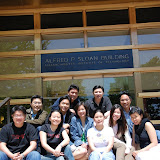 |
| ThaiSloani |
Thursday, May 03, 2007
Wednesday, May 02, 2007
Friday, April 27, 2007
Sunday, April 22, 2007
ขอบคุณพี่เอที่ส่ง clip นี้มาให้ดู จริงๆ แล้วเคยอ่าน transcript สำหรับ commence นี้แล้วเมื่อปีก่อนๆ แต่พอได้เห็นของจริงแล้วรู้สึกว่าทรงพลังกว่าจริงๆ ได้ฟังแล้วก็ทำให้นึกถึงหลายๆ สิ่งหลายๆ อย่าง ช่วยเตือนสติตัวเอง และย้อนดูตัวเองอย่างจริงๆ จังๆ
ก่อนมาที่นี่ ได้ยินผู้คนพูดถึงนักเรียนทุนฯ ของบริษัทในแง่มุมต่างๆ กัน แน่นอนว่าหลายคนชื่นชมที่พวกเราสามารถฝ่าฟันด่านอรหันต์หลายๆ จนจบการศึกษากันไปได้ แต่หลายคนก็แอบรำพึงให้ได้ยินว่า ทำไมนักเรียนทุนหลายคนถึงเปลี่ยนไปเป็นคนละคนกับที่เคยรู้จัก หลังจากที่กลับมาจากเมืองนอกแล้ว
บางคนเริ่มพูดจาภาษาต่างดาวที่คนทั่วไปไม่เข้าใจ ทำไมหลายคนดูหงุดหงิดง่ายขึ้น สายตาที่เคยอ่อนโยนกลับกลายเป็นสายตาเชือดเฉือน ได้ฟังเรื่องราวเหล่านี้แล้วมันทำให้เราต้องตรวจใจ และตรวจพฤติกรรมตัวเองอยู่ตลอดเวลา เรากลายเป็นคนเห็นแก่ตัวหรือเปล่า เรากลายเป็นคนที่เห็นแต่ประโยชน์ของตัวเองมากเกินไปหรือเปล่า เรามองว่าคนอื่นๆ ที่ไม่ได้โอกาสมาเรียนต่างประเทศอย่างเราโง่หรือเปล่า
ผมมีความเชื่ออย่างหนึ่งว่า มนุษย์ทุกคนมีสติปัญญาไม่แตกต่างกัน แต่ที่แตกต่างกันคือทางที่แต่ละคนเลือก ชาวนาที่มหาสารคามก็มีภูมิปัญญาอย่างหนึ่งที่ Ph.D. Systems Dynamic ไม่สามารถลอกเลียนได้ จับกังที่ท่าเรือบางนาก็มีความอดทน ความเข็มแข็งทั้งใจและกายที่ MBA ไหนๆ ก็ไม่สามาารถเลียนแบบได้
ทุกคนมีความแตกต่าง มีความสามารถที่ไม่เหมือนกัน เราอย่าเอาไม้บรรทัดของเราไปวัดว่าใครโง่ ใครฉลาด แม้แต่นิยามของความสำเร็จ แต่ละคนก็มีไม่เหมือนกัน บางคนคิดว่าแค่การได้มีครอบครัวที่อบอุ่นอยู่พร้อมหน้าพร้อมตา ก็คือความสำเร็จแล้ว แต่บางคนมองว่าต้องรวยเป็นร้อยล้านพันล้านถึงจะประสบความสำเร็จ ไม่มีใครผิด ไม่มีใครถูก เพราะนั่นเป็นทางเลือกของแต่ละคน
สิ่งที่มีค่าที่สุดที่ได้จาก Steve Jobs ก็คือ จงเดินตามความฝัน ตามที่ใจตัวเองปรารถนา อย่าเดินอยู่ในเงา อยู่ในความคิดของคนอื่น และจงระลึกไว้เสมอว่าเราอาจจะตายในวันนี้พรุ่งนี้ก็เป็นได้ ผมอยากจะขอเติมอีกนิดว่า จงใส่ใจกับคนรอบข้าง ชุมชนและสังคมที่เราอยู่ ถึงแม้เราจะเก่งแค่ไหน แต่หากคนรอบข้างเรา สังคมที่เราอยู่ ยังอยู่ในสภาวะย่ำแย่ เราก็คงไม่อาจมีความสุขได้อย่างแท้จริง
โสภณ สุภาพงษ์ เคยพูดไว้ในรายการ the Icon ไว้ว่า พระพุทธเจ้าแบ่งบัวออกเป็น 4 เหล่า แต่ท่านมิได้หมายความให้เราดูถูกบัวที่อยู่ใต้น้ำหรืออยู่ในภาวะที่ต่ำต้อยกว่า หากเลือกได้ จะขอเป็นน้ำเพื่อหล่อเลี้ยงบัวทุกเหล่า ให้มีชีวิตอยู่และอยู่ร่วมกันได้อย่างมีความสุข
Monday, April 16, 2007
Sunday, April 15, 2007
Joana: “Is it time to eat yet?”
Magic 8 Ball: “My sources say yes.”
Eric: “Should we order pizza?”
Magic 8 Ball: “The future looks hazy.”
Mengjin: “How about Thai?”
Magic 8 Ball: “No”
Joana: “Let’s have Chinese then”
Magic 8 Ball: “Maybe another time”
Eric: “Should we order pizza?”
Magic 8 Ball: “Outlook not so good”
…
Although the Magic 8 Ball was surprisingly consistent in predicting that we would not order pizza, we ended up ordering pizza.
After working for almost 10 hours on our presentation for the McKinsey Business Technology Challenge, any excuse not to think was welcomed. The challenge: pick a Fortune 100 company and show how one of four technologies can dramatically improve it. That is a pretty broad topic to cover. The technologies were crowd-sourcing (like this blog), ubiquitous connectivity, virtual worlds and smart network elements. My team’s task was to build a case for the company to adopt a new technology complete with financial models. All that to be reduced into a 12 page PowerPoint presentation due within 48 hours.
Not knowing that it was a long weekend when I signed up for the competition, I was not looking forward to spending it PowerPointing at all. Amazingly, this challenge has turned out to be a lot of fun. I got to brush up on chapter 1 of my Mandarin lesson, made some new friends and learned new things including the risks that a company would consider when evaluating a new technology.
This has been a weekend very well spent. It was intense but enjoyable. I felt that I accomplished something rather than wasting my weekend away sleeping. I would strongly recommend anyone who is interested in consulting to participate in at least one competition. Having participated in both the AT Kearney Case Competition and the McKinsey Business Technology Challenge, I do prefer the shorter case competitions over the longer ones.
Good luck on your case competition!
Friday, April 13, 2007
 Jack Welch อดีต CEO ของ GE ที่หลายคนยกย่องว่าเป็นหนึ่งใน management guru และสุดยอด CEO ของโลก กลับมาเยี่ยมเยือน Sloan School of Management อีกครั้ง แน่นอนว่าผู้คนแห่แหนกันมาดูลุง Jack จนที่นั่งใน Wong Auditorium ไม่พอ ต้องเปิด Overflow Room เพิ่มอีกสองห้อง ถือได้ว่าเป็น Dean's Innovative Speaker Series ที่ได้รับความนิยมมากที่สุดในรอบปี (รองลงมาก็คือ Carly Fiorina)
การ คนที่นั่งข้างๆ ลุง Jack คือ Alex d'Arbeloff เป็น Professor ของ Sloan ที่สอนวิชาชื่อประหลาด Conversations with Alex d'Arbeloff (อยากรู้ประวัติของลุง Alex ก็ไป wikipedia ดูได้ เพิ่งรู้ว่าแกเป็นเจ้าของ Filene's Basement)
Jack Welch อดีต CEO ของ GE ที่หลายคนยกย่องว่าเป็นหนึ่งใน management guru และสุดยอด CEO ของโลก กลับมาเยี่ยมเยือน Sloan School of Management อีกครั้ง แน่นอนว่าผู้คนแห่แหนกันมาดูลุง Jack จนที่นั่งใน Wong Auditorium ไม่พอ ต้องเปิด Overflow Room เพิ่มอีกสองห้อง ถือได้ว่าเป็น Dean's Innovative Speaker Series ที่ได้รับความนิยมมากที่สุดในรอบปี (รองลงมาก็คือ Carly Fiorina)
การ คนที่นั่งข้างๆ ลุง Jack คือ Alex d'Arbeloff เป็น Professor ของ Sloan ที่สอนวิชาชื่อประหลาด Conversations with Alex d'Arbeloff (อยากรู้ประวัติของลุง Alex ก็ไป wikipedia ดูได้ เพิ่งรู้ว่าแกเป็นเจ้าของ Filene's Basement)รูปแบบการสนทนาในวันนี้เป็นแบบ Q&A คือ ลุง Alex ถาม ลุง Jack ตอบ ตอนเห็นลุง Jack ครั้งแรกรู้สึกว่าทำไมแกดูเซื่องๆ จัง แต่พอแกตอบคำถามแค่นั้นแหละ เปลี่ยนเป็นคนละคน กลับดูขึงขังและมีพลังขึ้นอย่างเฉียบพลัน
ลุง Jack ตอบคำถามได้ดีมากๆ สมกับที่เป็น CEO ที่ทุกคนยกย่อง ขอหยิบเอาบางประเด็นมาเล่าให้ฟัง เพราะจำได้ไม่หมด (บางอันก็ฟังไม่ทัน .. เฮ้อ)
- Organizational Study VS. Strategy : ทุกวันนี้ B-School ให้ความสำคัญกับ Strategy มากแต่กลับละเลย Organizational Study อย่างที่เห็นว่า อาจารย์ที่สอน Strategy จะดูมีฐานะทางสังคมที่ดีกว่าอาจารย์ที่สอน Organizational Study จากประสบการณ์ของลุง Jack แกบอกว่า Strategy ก็สำคัญ เพราะมันเป็น foundation ขององค์กร แต่ Organizational Study จะเป็นตัวที่ผลักดันให้องค์กรก้าวไปข้างหน้าอย่างมั่นคง พูดง่ายๆ ก็คือ แทนที่จะสนใจแต่ external consistency อย่างเดียว ให้หันมามอง internal consistency มากขึ้น โดยเฉพาะเรื่องของ "คน"
- ฺBottom 10 : มีคนถามแกว่า การตัดคนที่ผลงานแย่สุด 10% ออกจากบริษัทเป็นแนวคิดที่ถูกต้องแล้วหรือ ? คำตอบของลุงก็คือ ถูกต้องแล้ว ในเมื่อบริษัทมีคนที่ทำงานดี top 20 อยู่แล้ว ใยต้องมาคำนึงถึง bottom 10 แกยังบอกว่า การไล่คนออกนั้นไม่ใช่เรื่องง่าย ไม่ใช่อยู่ดีๆ ก็ไล่ออกเลย ต้องมีการให้ feedback เป็นระยะๆ (let them know where they stand)จนเห็นว่าไม่มีทางที่จะดีขึ้นจริงๆ ก็จำเป็นต้องเชิญออก ในส่วนนี้ manager ต้องรับหน้าที่เป็นผู้สื่อสาร หากสื่อสารไม่ดี พนักงานคนนั้นอาจจะเอาบริษัทไปพูดในทางเสียๆ หายๆ ได้ ในแวดวง HR เรารู้กันดีว่า การเอาคนออกนั้นมันมีทั้งดีและเสีย ข้อเสียก็คือ แน่นอนว่าคนๆ นั้นต้องตกงาน แต่ข้อดีก็คือ คนๆนั้นจะได้มีโอกาสไปเริ่มชีวิตใหม่ (ถ้าเราให้เขาออกแต่เนิ่นๆ ไม่ใช่ดองไว้จนแก่) และอาจจะประสบความสำเร็จมากกว่าที่อยู่กับบริษัทก็เป็นได้
- The rise of PE and IB: ทุกวันนี้ งานที่บรรดาคน MBA ให้ความสนใจมากเป็นพิเศษก็คือ Private Equity และ Investment Banking (new brain drain) เนื่องจากเป็นงานที่จ่ายงามและท้าทาย แถมยังไม่มีปัญหาเรื่อง bureaucratic มาให้วุ่นวายใจมากมายนัก เพราะฉะนั้นหากบริษัทใดๆ ก็ตามต้องการดึงคนเก่งๆ ไว้ต้องพยายามสร้างบรรยากาศให้ได้เหมือน PE และ IB ในเรื่องของ monetary reward อาจจะไม่สำคัญนัก หากบริษัทไม่มีเงินมากพอ แต่เรื่องของ challenging work และ non-bureaucratic นี่สำคัญ คน generation นี้ ชอบอะไรที่เป็นอิสระและท้าทาย ลุง Alex ดอดถามไปนิดนึงว่าแล้ว consulting ล่ะ ดูเหมือนว่าลุง jack ตอบว่า no way ตอนนี้เป็นขาลงของ consulting คนส่วนใหญ่เริ่มรู้ตัวแล้วว่าควรจะหยุดเอาแต่พูด แล้วเริ่มลงมือทำเสียที (ดูเหมือนแกจะไม่ค่อยชอบ consulting นะ)
- Work-life Chioces: คำถามนี้ classic จะ balance ชีวิตส่วนตัวและการทำงานได้อย่างไร ในวันก่อนที่ GM ของ ClubMed มาก็มีคนถามคำถามนี้ คำตอบของ GM Clubmed และลุง Jack นั้นคล้ายกัน ก็คือ ไม่มีหรอกไอ้ที่เรียกว่า Work-life Balance โลกนี้มีแต่ Work-life Choices เราต้องเลือกว่าจะทุ่มเทให้กับสิ่งไหนมากกว่ากัน ทำสิ่งไหนแล้วเรามีความสุขมากกว่ากัน ผมเองเห็นด้วยกับแนวคิดนี้ เพราะเห็นตัวอย่างมามากมายว่าคนที่ประสบความสำเร็จในชีวิตการงานนั้น ส่วนมากจะต้อง trade-off กับชีวิตครอบครัว แต่ที่น่าทึ่งก็คือ ยังมีบางคนที่สามารถประสบความสำเร็จทั้งสองอย่างได้พร้อมๆ กัน คงเป็นความสามารถเฉพาะตัวที่ยากจะเลียนแบบได้
ขอบคุณที่อดทนอ่านมาถึงบรรทัดนี้ 8)
Saturday, April 07, 2007
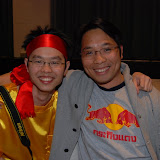 |
| TSMIT Sonkran Party |
Here is an excerpt from "The Corporation" .. worth watching !
Ray Anderson on Sustainability
Thursday, April 05, 2007
I think we're alone here .. you and I
I think we're alone in the universe tonight
David Usher อดีตนักร้องนำของวงร็อคจากแคนาดา Moist หากยังพอจำเพลงได้ เขาเคยร้องท่อนฮุคไว้เป็นภาษาไทย ตอนนั้นฟังแล้วอยากเอาขี้เถ้ายัดปากคนคิด เพราะมันทำให้เพลงดีๆ กลายเป็นเพลงห่วยไปในทันที
สิ่งที่น่าสนใจสำหรับ David Usher ก็คือเขามีแม่เป็นคนไทยชื่อว่า Samphan Usher เป็นศิลปินสีน้ำที่มีชื่อเสียงพอสมควร ส่วนพ่อเป็นนักเศรษฐศาสตร์อยุ่ทีมหาวิทยาลัย Queens ถือว่าเป็นส่วนผสมที่แปลกใช้ได้ เพลงนี้ชอบตรงท่อนที่ว่า I think we're alone here .. you and I .. I think we're alone in the universe tonight ลองคิดดูว่าหากเราขึ้นไปลอยเท้งเต้งอยู่นอกโลก รอบตัวมีแต่ดำมืดมิด มันจะเหงาสักขนาดไหน ว่าแล้วก็ทดลองปิดไฟนั่งอยู่เงียบๆ คนเดียวสัก 20 นาที (ห้ามหลับ) มันก็ให้ความรู้สึกแปลกไปอีกแบบ
Tuesday, April 03, 2007
Sunday, April 01, 2007
Tomorrow, the H2 will begin .. sigh ..
 |
| The end of Spring Break |
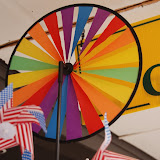 |
| Seattle - 2nd day |
 |
| Sanfrancis |
 |
| SanFrancis |
Ane more albums at http://picasaweb.google.com/niranb
Friday, March 23, 2007
lost my passport but still happy .. (i guess)
 |
| LA-1st day |
Tuesday, March 20, 2007
 |
| Wine Tasting + Suki |
singing while being drunk ... ดิบดี
Now Playing: ฝากรัก
Saturday, March 17, 2007
We drove up north to Vermont this Tuesday to finish up our project for 15.569. We met Gregor, a wonderful guy who really cares about world changing climate. He asked what inspired us the most and made a short clip post it on Inspired Protagonist blog.
Visit http://www.inspiredprotagonist.com
Friday, March 16, 2007
Everyday's a fine day.
Katie Melua - I Cried for You
I don't know why during this happy moment I'm thinking of this song. It's the best song by Katie Melua. She was very emotional when singing in this MV.
Tuesday, March 13, 2007
Sunday, March 11, 2007
Thursday, March 08, 2007
.jpg)
.jpg)
.jpg)
.jpg) Last night 4 Thai guys went to Oishi, the best Japanese restaurant in Boston according to P'A's opinion. We were so lucky that we did not have to wait. Typically, it would take approx. 30 min. - 1 hr. to be seated. We made a consensus to try Chef's Selection menu (i can't remember how it is called in Japanese), as shown in pictures. Everyone was so ecstatic and enjoyed eating this menu but we all were a bit shocked when we saw the bill ...... T_T
Last night 4 Thai guys went to Oishi, the best Japanese restaurant in Boston according to P'A's opinion. We were so lucky that we did not have to wait. Typically, it would take approx. 30 min. - 1 hr. to be seated. We made a consensus to try Chef's Selection menu (i can't remember how it is called in Japanese), as shown in pictures. Everyone was so ecstatic and enjoyed eating this menu but we all were a bit shocked when we saw the bill ...... T_T
Tuesday, March 06, 2007
ผูกพัน - ตรัย ภูมิรัตน์
This amateur MV works well in depicting loneliness (especially of people in the big city). Huhr .. i miss Bangkok.
Monday, March 05, 2007
Sunday, March 04, 2007
Thursday, February 22, 2007
Sunday, February 18, 2007
Thursday, February 15, 2007
Eric Anderson (visiting assistant professor ของ Kellogg) และ Duncan Simester (associate professor ของ MIT) เขียนบทความชื่อว่า Mind Your Pricing Cues ลงใน Harvard Business Review เมื่อปี 2003 ทั้งสองคนได้ตั้งข้อสังเกตไว้ว่าผู้บริโภคส่วนใหญ่ไม่ได้รู้จริงๆ หรอกว่าของที่กำลังซื้ออยู่นั้นมันถูกหรือแพง ส่วนใหญ่แล้วผู้บริโภคมักจะติดกับของผู้ขายที่ใช้ pricing cues หลอกล่อ ตอนนี้หลายคนอาจสงสัยว่า pricing cues คืออะไร บอกได้เลยว่าทุกคนล้วนเคยผ่านหูผ่านตามาแล้วทั้งนั้น
Sale .. Sale .. Sale
Cue ตัวแรก ไม่มีใครไม่เคยเห็น โดยเฉพาะคุณผู้หญิง พอเห็นป้ายนี้ปุ๊บ ต้องรี่เข้าไปในร้านทันที่ มีงานวิจัยชิ้นหนึ่ง บอกว่า แค่เพียงใส่คำว่า Sale ลงไปในแคตาลอกโฆษณาสินค้า สามารถเพิ่ม demand ให้กับสินค้าชิ้นนั้นๆ ได้กว่า 50%
แต่..ระวังให้ดี..บางครั้งป้าย Sale ก็ไม่ได้ Sale จริงๆ เสมอไป มีผู้ขายหลายรายยอมรับตรงๆ ว่า ไอ้ป้ายที่แปะว่า Sale นั้น จริงๆ มันไม่ได้ลดราคาอะไรหรอก เมื่อหลายปีที่ผ่านมา หนังสือพิมพ์ Boston Globe จับได้ว่าห้างสรรพสินค้าแห่งหนึ่งในรัฐ Massachusetts โก่งราคาสินค้าจริง แล้วติดป้ายลดราคาให้เท่ากับราคาสินค้าปกติ จะว่าไปแล้ว หลายคนก็คงรู้ว่า ป้ายลดราคาบางที่ มันไม่ได้ลดจริงๆ (จตุจักร?) แต่ทำไมผู้ซื้อหลายคนก็ยังหักห้ามใจไม่ได้ที่จะเข้าไปซื้อของในร้านที่มีป้ายลดราคา?
เหตุผลก็คือ ร้านค้าส่วนใหญ่ โดยเฉพาะร้าน Brand name ยี่ห้อดังๆ เวลาติดป้ายลดราคา เขาลดราคาลงมาจากราคาปกติจริงๆ ร้านค้าพวกนี้ไม่กล้าเสี่ยงกับการโกงแล้วถูกจับได้ เพราะจะทำให้ชื่อเสียงเสียหาย แค่เงินไม่กี่บาทกับชื่อเสียงที่สั่งสมมานาน คงไม่คุ้มกัน
นอกจากนี้ ยังมีงานวิจับเกี่ยวกับความน่าเชื่อถือของสินค้ากับจำนวนป้ายลดราคา พบว่าหากติดป้ายลดราคาในสินค้าชนิดหนึ่งๆ มากเกินไป จะทำให้ประสิทธิภาพของ pricing cue นั้นลดลง ทีมงานวิจัย เอาป้ายลดราคาไปติดที่ชั้นน้ำผลไม้ supermarket แห่งหนึ่ง โดยเพิ่มจำนวนป้ายขึ้นเรื่อยๆ แล้วสังเกตพฤติกรรมของผู้บริโภค พบว่าหากมีป้ายมากเกินกว่า 30% ของตัวสินค้า จะทำให้ demand ในสินค้าประเภทนั้นๆ ลดลง
ในประเทศสหรัฐอเมริกานั้น การติดป้ายลดราคา ต้องทำอย่างระมัดระวังเป็นพิเศษ จะทำพร่ำเพรื่อ หรือหลอกลวงประชาชนไม่ได้ เพราะมีหูมีตาจากเจ้าหน้าที่รัฐคอยสอดส่องมากมาย หากติดมั่ว อาจโดนฟ้องเสียเงินเสียทองและเสียชื่อเสียงได้
99 ครับพี่ 99
เมื่อก่อนเคยคิดว่าอาถรรพ์เลข 9 นี้มีแต่ที่ไทยแลนด์แสนรักของเราอย่างเดียว แต่ที่ไหนได้ มันเป็นปรากฎการณ์ที่เกิดขึ้นทั่วโลก งานวิจัยชิ้นหนึ่ง ทดลองขึ้นราคากระโปรงจาก 34 เหรียญเป็น 39 เหรียญ พบว่า demand เพิ่มขึ้นถึงกว่า 33% แต่หากขึ้นราคาจาก 34 เหรียญเป็น 44 เหรียญนั้นแทบจะไม่มีผลใดๆ กับ demand
เช่นเดียวกับป้ายลดราคา ผู้ขายจะใช้ราคาเลข 9 พร่ำเพรื่อไม่ได้ ตัวอย่างที่เห็นได้ชัดก็คือเสื้อผ้ายี่ห้อดัง J.Crew และ Ralph Lauren มักจะลงท้ายสินค้าราคาปกติด้วยเลข 00 แต่พอสินค้าชิ้นไหนลดราคา จะลงท้ายด้วย 9 แทน ส่วนผู้ขายบางรายไม่ได้เข้าใจจิตวิทยาตรงนี้ ติดป้ายเลข 9 ทั้งร้าน จึงทำให้ผู้ซื้อไม่ได้รู้สึกว่าสินค้าแต่ละชิ้นในร้านนั้นแตกต่างด้านราคากันแต่อย่างใด นอกจากนี้ผลการวิจัยยังบอกว่าหากมีป้ายลดราคาอยู่แล้ว การลงท้ายราคาด้วย 9 แทบจะไม่มีผลใดๆ ต่อการตัดสินใจซื้อของคนทั่วไป
ต๊าย ขนาดกระดาษชำระยังถูกขนาดนี้ แสดงว่าอย่างอื่นต้องถูกแน่ๆ
ผู้บริโภคมักจะจดจำราคาสินค้าที่เราซื้อกันเป็นประจำได้ อย่างเช่นพวกน้ำอัดลมต่างๆ หรือน้ำปลา ผู้ขายมักจะใช้สินค้าพวกนี้โน้มนำความรู้สึกของผู้บริโภค เรามักจะตั้งข้อสันนิษฐานว่า หากสินค้าชิ้นหนึ่งในร้านถูก สินค้าชิ้นอื่นๆ ก็จะถูกไปด้วย(โดยเฉพาะสินค้าที่เราไม่ได้ใช้บ่อยๆ จำราคาไม่ค่อยได้) ดังนั้นอย่าแปลกใจหากเข้าไปใน supermarket หรือพวก megastore ต่างๆ จะเห็นราคาสินค้าที่เราใช้ประจำลดราคาอยู่ (ที่อเมริกานี้ หากเราเข้าไปใน supermarket อย่าง Shaws จะเห็นว่าน้ำอัดลมยี่ห้อดังมันลดราคากันทั้งปี)
รับประกันว่าถูกที่สุดในย่านนี้ หากเจอที่ไหนถูกว่า ยินดีคืนเงิน
มุขนี้เราเจอกันประจำ โดยเฉพาะพวก megastore ทั้งหลายแหล่ ถือว่าเป็นอีกวิธีหนึ่งที่ได้ผล จากการวิจัยพบว่า การติดป้ายบอกว่าการติดป้ายรับประกันราคาว่าถูกที่สุด มีผลทำให้ผู้บริโภคคิดว่า สินค้าอื่นๆ ในร้านก็จะถูกไปด้วย
อย่างไรก็ตาม สำหรับผู้ขายเอง ต้องระวังการรับประกันราคาแบบนี้ให้ดี เพราะอาจจะนำไปสู่การหั่นราคาแข่งกัน จนกลายเป็นสงครามราคา ทำให้เจ็บตัวทั้งสองฝ่ายได้
บางครั้งการประกันราคาแบบนี้ ก็ทำให้ผู้ขายเจ็บตัวได้ Tesco สาขาหนึ่งในประเทศอังกฤษซึ้งเรื่องนี้ดี เมื่อ Essential Sports ร้านขายสินค้ากีฬา ลดราคาถึงเท้า Nike เหลือแค่ 10 เพนนีต่อคู่ หั่นราคาของ Tesco ไปถึง 7.90 ปอนด์ ลูกค้ารายหนึ่งเผอิญสังเกตเห็นราคาที่แตกต่างของทั้งสองเจ้านี้พอดี เลยกลับมาเคลมราคาที่ Tesco ผลก็คือลูกค้าคนนั้นเดินกลับบ้านไปด้วยถุงเท้า 12 คู่ พร้อมกับเงินอีกกว่า 90 ปอนด์ในกระเป๋า
ผู้บริโภคส่วนใหญ่มิได้เคลือบแคลงสงสัยราคาที่ผู้ขายตั้งไว้ จึงตกอยู่ในสถานะที่ด้อยกว่า ผู้ขายบางฉวยโอกาสตรงนี้ ตั้งราคาที่ไม่เป็นธรรม ถือเป็นการคิดสั้น และคิดผิดอย่างยิ่ง ผู้ขายควรจะต้องใส่ใจคุณภาพของสินค้าพอๆ กับใส่ใจราคา และพยายามสร้างความไว้เนื้อเชื่อใจกันระหว่างผู้ขายกับผู้บริโภคในระยะยาว ทั้งนี้เพื่อให้เกิดประโยชน์กันทั้งสองฝ่าย และส่งผลให้เกิดกับสังคมโดยรวมด้วย
> เรียบเรียงจาก Harvard Business Review – September 2003
Matt Costa & Jack Johnson - Lullaby
When you're so lonely lying in bed
Night's closed it's eyes but you can't rest your head
Everyone's sleeping all through the house
You wish you could dream but forgot to somehow
Sing this lullaby to yourself
Sing this lullaby to yourself
And if you are waiting, waiting for me
Know I'll be home soon darling I guarantee
I'll be home Sunday just in one week
Dry up your tears if you start to weep
And sing this lullaby to yourself
Sing this lullaby to yourself
Lullaby, I'm not nearby
Sing this lullaby to yourself
Don't you cry, no don't you cry
Sing this lullaby to yourself
Cause when I arrive dear it won't be that long
No it won't seem like anytime that I've been gone
It ain't the first time it won't be the last
Won't you remember these words to help the time pass?
So when you're so lonely lying in bed
Night's closed it's eyes but you can't rest your head
Everyone's sleeping all through the house
You wish you could dream but forgot to somehow
Sing this lullaby to yourself
Sing this lullaby to yourself
Sing this lullaby, sing this lullaby
Sing this lullaby to yourself
Friday, February 09, 2007
Thoughts on Music
Steve Jobs
February 6, 2007
With the stunning global success of Apple’s iPod music player and iTunes online music store, some have called for Apple to “open” the digital rights management (DRM) system that Apple uses to protect its music against theft, so that music purchased from iTunes can be played on digital devices purchased from other companies, and protected music purchased from other online music stores can play on iPods. Let’s examine the current situation and how we got here, then look at three possible alternatives for the future.
To begin, it is useful to remember that all iPods play music that is free of any DRM and encoded in “open” licensable formats such as MP3 and AAC. iPod users can and do acquire their music from many sources, including CDs they own. Music on CDs can be easily imported into the freely-downloadable iTunes jukebox software which runs on both Macs and Windows PCs, and is automatically encoded into the open AAC or MP3 formats without any DRM. This music can be played on iPods or any other music players that play these open formats.
The rub comes from the music Apple sells on its online iTunes Store. Since Apple does not own or control any music itself, it must license the rights to distribute music from others, primarily the “big four” music companies: Universal, Sony BMG, Warner and EMI. These four companies control the distribution of over 70% of the world’s music. When Apple approached these companies to license their music to distribute legally over the Internet, they were extremely cautious and required Apple to protect their music from being illegally copied. The solution was to create a DRM system, which envelopes each song purchased from the iTunes store in special and secret software so that it cannot be played on unauthorized devices.
Apple was able to negotiate landmark usage rights at the time, which include allowing users to play their DRM protected music on up to 5 computers and on an unlimited number of iPods. Obtaining such rights from the music companies was unprecedented at the time, and even today is unmatched by most other digital music services. However, a key provision of our agreements with the music companies is that if our DRM system is compromised and their music becomes playable on unauthorized devices, we have only a small number of weeks to fix the problem or they can withdraw their entire music catalog from our iTunes store.
To prevent illegal copies, DRM systems must allow only authorized devices to play the protected music. If a copy of a DRM protected song is posted on the Internet, it should not be able to play on a downloader’s computer or portable music device. To achieve this, a DRM system employs secrets. There is no theory of protecting content other than keeping secrets. In other words, even if one uses the most sophisticated cryptographic locks to protect the actual music, one must still “hide” the keys which unlock the music on the user’s computer or portable music player. No one has ever implemented a DRM system that does not depend on such secrets for its operation.
The problem, of course, is that there are many smart people in the world, some with a lot of time on their hands, who love to discover such secrets and publish a way for everyone to get free (and stolen) music. They are often successful in doing just that, so any company trying to protect content using a DRM must frequently update it with new and harder to discover secrets. It is a cat-and-mouse game. Apple’s DRM system is called FairPlay. While we have had a few breaches in FairPlay, we have been able to successfully repair them through updating the iTunes store software, the iTunes jukebox software and software in the iPods themselves. So far we have met our commitments to the music companies to protect their music, and we have given users the most liberal usage rights available in the industry for legally downloaded music.
With this background, let’s now explore three different alternatives for the future.
The first alternative is to continue on the current course, with each manufacturer competing freely with their own “top to bottom” proprietary systems for selling, playing and protecting music. It is a very competitive market, with major global companies making large investments to develop new music players and online music stores. Apple, Microsoft and Sony all compete with proprietary systems. Music purchased from Microsoft’s Zune store will only play on Zune players; music purchased from Sony’s Connect store will only play on Sony’s players; and music purchased from Apple’s iTunes store will only play on iPods. This is the current state of affairs in the industry, and customers are being well served with a continuing stream of innovative products and a wide variety of choices.
Some have argued that once a consumer purchases a body of music from one of the proprietary music stores, they are forever locked into only using music players from that one company. Or, if they buy a specific player, they are locked into buying music only from that company’s music store. Is this true? Let’s look at the data for iPods and the iTunes store – they are the industry’s most popular products and we have accurate data for them. Through the end of 2006, customers purchased a total of 90 million iPods and 2 billion songs from the iTunes store. On average, that’s 22 songs purchased from the iTunes store for each iPod ever sold.
Today’s most popular iPod holds 1000 songs, and research tells us that the average iPod is nearly full. This means that only 22 out of 1000 songs, or under 3% of the music on the average iPod, is purchased from the iTunes store and protected with a DRM. The remaining 97% of the music is unprotected and playable on any player that can play the open formats. It’s hard to believe that just 3% of the music on the average iPod is enough to lock users into buying only iPods in the future. And since 97% of the music on the average iPod was not purchased from the iTunes store, iPod users are clearly not locked into the iTunes store to acquire their music.
The second alternative is for Apple to license its FairPlay DRM technology to current and future competitors with the goal of achieving interoperability between different company’s players and music stores. On the surface, this seems like a good idea since it might offer customers increased choice now and in the future. And Apple might benefit by charging a small licensing fee for its FairPlay DRM. However, when we look a bit deeper, problems begin to emerge. The most serious problem is that licensing a DRM involves disclosing some of its secrets to many people in many companies, and history tells us that inevitably these secrets will leak. The Internet has made such leaks far more damaging, since a single leak can be spread worldwide in less than a minute. Such leaks can rapidly result in software programs available as free downloads on the Internet which will disable the DRM protection so that formerly protected songs can be played on unauthorized players.
An equally serious problem is how to quickly repair the damage caused by such a leak. A successful repair will likely involve enhancing the music store software, the music jukebox software, and the software in the players with new secrets, then transferring this updated software into the tens (or hundreds) of millions of Macs, Windows PCs and players already in use. This must all be done quickly and in a very coordinated way. Such an undertaking is very difficult when just one company controls all of the pieces. It is near impossible if multiple companies control separate pieces of the puzzle, and all of them must quickly act in concert to repair the damage from a leak.
Apple has concluded that if it licenses FairPlay to others, it can no longer guarantee to protect the music it licenses from the big four music companies. Perhaps this same conclusion contributed to Microsoft’s recent decision to switch their emphasis from an “open” model of licensing their DRM to others to a “closed” model of offering a proprietary music store, proprietary jukebox software and proprietary players. The third alternative is to abolish DRMs entirely. Imagine a world where every online store sells DRM-free music encoded in open licensable formats. In such a world, any player can play music purchased from any store, and any store can sell music which is playable on all players. This is clearly the best alternative for consumers, and Apple would embrace it in a heartbeat. If the big four music companies would license Apple their music without the requirement that it be protected with a DRM, we would switch to selling only DRM-free music on our iTunes store. Every iPod ever made will play this DRM-free music.
Why would the big four music companies agree to let Apple and others distribute their music without using DRM systems to protect it? The simplest answer is because DRMs haven’t worked, and may never work, to halt music piracy. Though the big four music companies require that all their music sold online be protected with DRMs, these same music companies continue to sell billions of CDs a year which contain completely unprotected music. That’s right! No DRM system was ever developed for the CD, so all the music distributed on CDs can be easily uploaded to the Internet, then (illegally) downloaded and played on any computer or player.
In 2006, under 2 billion DRM-protected songs were sold worldwide by online stores, while over 20 billion songs were sold completely DRM-free and unprotected on CDs by the music companies themselves. The music companies sell the vast majority of their music DRM-free, and show no signs of changing this behavior, since the overwhelming majority of their revenues depend on selling CDs which must play in CD players that support no DRM system.
So if the music companies are selling over 90 percent of their music DRM-free, what benefits do they get from selling the remaining small percentage of their music encumbered with a DRM system? There appear to be none. If anything, the technical expertise and overhead required to create, operate and update a DRM system has limited the number of participants selling DRM protected music. If such requirements were removed, the music industry might experience an influx of new companies willing to invest in innovative new stores and players. This can only be seen as a positive by the music companies.
Much of the concern over DRM systems has arisen in European countries. Perhaps those unhappy with the current situation should redirect their energies towards persuading the music companies to sell their music DRM-free. For Europeans, two and a half of the big four music companies are located right in their backyard. The largest, Universal, is 100% owned by Vivendi, a French company. EMI is a British company, and Sony BMG is 50% owned by Bertelsmann, a German company. Convincing them to license their music to Apple and others DRM-free will create a truly interoperable music marketplace. Apple will embrace this wholeheartedly.
Thursday, February 08, 2007
Wednesday, February 07, 2007
Reflection Paper | Distributed Leadership
Leadership is always a difficult topic to understand. I used to be a member of a team that designed a leadership development program for a company in
Through the past six years of my career in human resource development and organizational development, I have seen a lot of employees, especially senior ones, afraid of stepping out of their own comfort zone and with no aspiration for improvement. No one is to blame but the system. It is the system that prevents people at the bottom level of an organization from being creative and having self-confidence. To solve this problem, we need to refurbish our old beliefs and conventional organizational structure. Leadership should be distributed to employees at all levels of the organization.
Nevertheless, it is hard to break old habits. I have a lot of questions in my mind that the workshop did not answer. Does Distributed Leadership create a shift of power? If so, will top management feel secure to delegate their power? As a general rule, more power or more authority comes with more responsibility. Will people, who have been in a comfort zone for most of their working lives, accept that?
To be honest, I expected to learn more regarding the implementation of a Distributed Leadership concept within an organization, especially how to make top management buy-in. I see a lot of growth and learning opportunities in several companies which have been locked up for many years. Distributed leadership might be the key that can unlock those opportunities by letting people show their real potential and expose their creativity. The workshop gave a clear picture of how to develop leadership in oneself but did not touch as thoroughly as it could have on helping others realize their leadership potential.
Personally, one of the most rewarding aspects of the workshop was the opportunity to reflect about myself, my vision and my goals. I rarely have the chance to sit down quietly and listen to my inner-self. To do so made me feel revitalized and fresh again.
In sum, I think Distributed Leadership is a class that all MBA students should take. MBA often focuses us too much on hard skills but I personally believe that soft skills are far more important in the long run.
“The greatest leader isn’t necessarily the one who does the greatest things. The greatest leader is the one who gets the people to do the greatest things.” – Ronald Reagan



